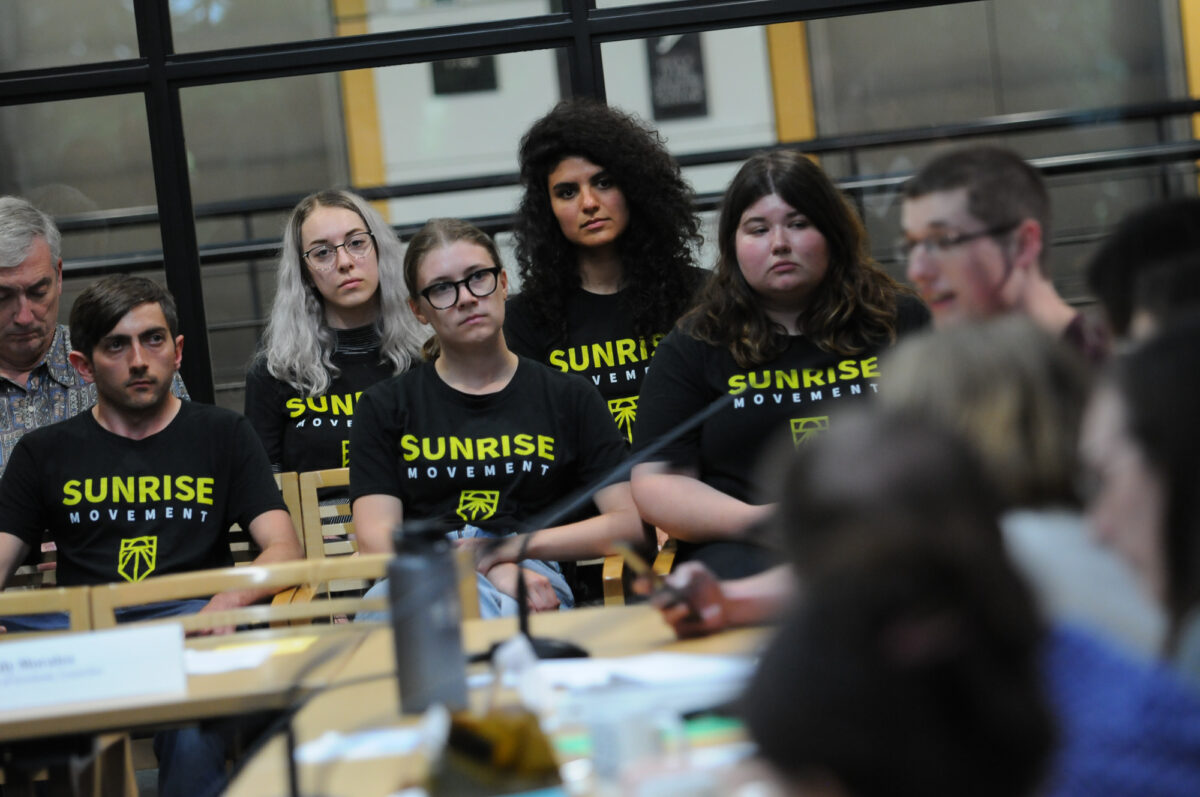
(Photos: J. Maus/BikePortland)
Concerns about climate change were made loud and clear to Metro’s Transportation Funding Task Force at their meeting last night. Metro is leading an effort to raise what some say could be as much as $20 billion for transportation infrastructure around the regional via a bond measure that could go to voters in November.
As lines are drawn on maps, lines are being drawn in the sand by electeds and advocates looking to stake out positions for debates to come.
“If we don’t make it clear to the public that our top priority is averting climate catastrophe, I don’t see it passing in Portland. And we need Portland to carry this measure.”
— Chloe Eudaly, Portland City Commissioner
This was the sixth meeting of the 35-member Task Force, which is made up of elected officials and advocates from around the region. With their input, Metro has whittled a list of 75 corridors down to 26. Now the job is to place these in three tiers. Metro wants the Task Force to recommend a prioritized list of “investment corridors” in time for a Metro Council work session on June 4th.
At last night’s meeting, dozens of Portlanders — and several notable Task Force members — elevated concerns about the process and whether or not Metro is doing enough to set the stage for an investment package that would lead to a dramatic reduction in vehicle miles traveled and greenhouse gas emissions. There was widespread concern that some of the corridors at the top of the list are merely placeholders for future freeway expansion projects that could increase driving capacity.
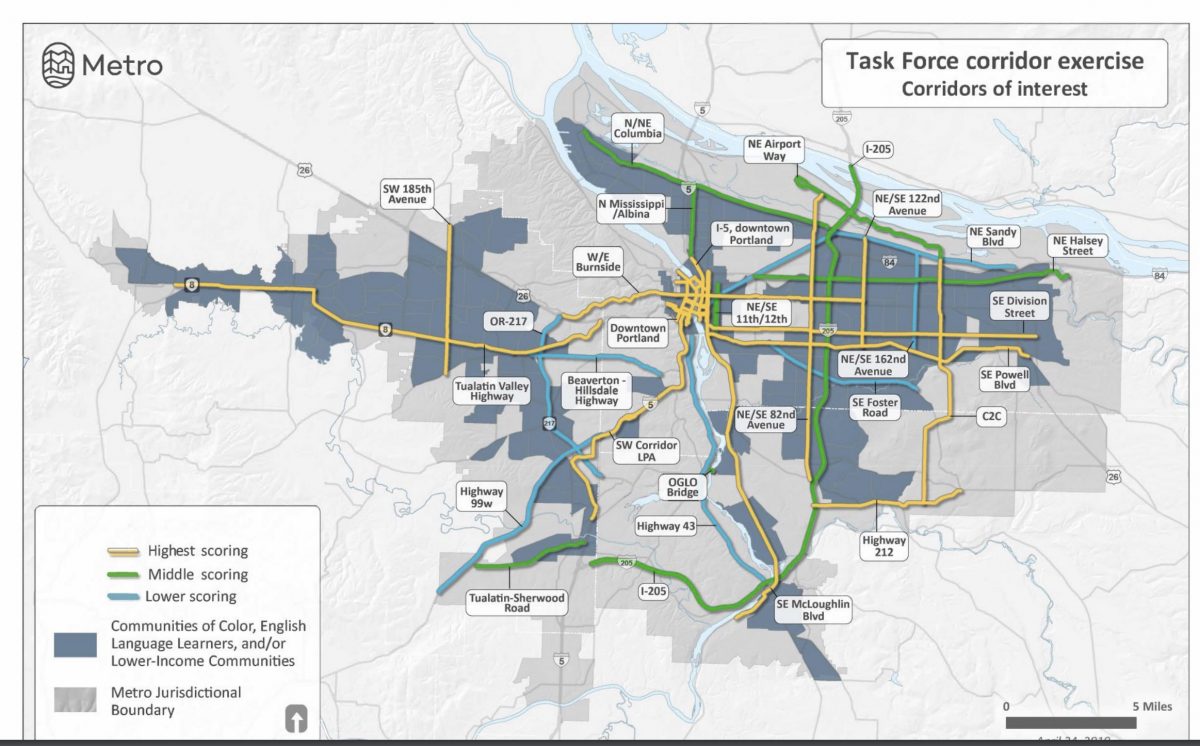
Kasandra Griffin with the Community Cycling Center and the Getting There Together Coalition opened the public comment period by saying, “According to Metro’s adopted policies, the priorities for this process are simple: Only pick projects that will reduce climate change and increase equity.” Griffin then suggested that four corridors Metro staff has recommended as a top priority should be removed from Tier 1 consideration: Highway 212 (Sunrise Corridor), I-5 through downtown Portland, Highway 217 and I-205.
Those corridors “represent old thinking,” Griffin said*.
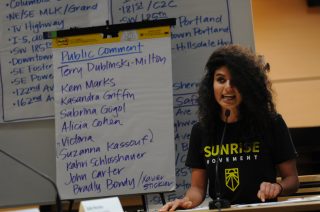
Volunteers with the Portland chapter of the national Sunrise Movement showed up in force last night. Wearing matching t-shirts, a few of them testified and about a dozen others were in attendance. 29-year-old Sunrise PDX Organizer Suzanna Kassouf said transportation justice is “at the very heart” of her group’s effort to “radically transform our societies and economies before our climate fate is sealed (in 11 years).”
“We are extremely concerned by the lack of priority placed on public transit as well as pedestrian and cyclist infrastructure in a city which considers itself a climate leader,” Kassouf said. “Many residents who depend on this infrastructure are members of our frontline communities. Specifically, low-income people of color, like myself.”
Kassouf said Metro’s bond measure is an opportunity to fund a Green New Deal for Oregon. “The young people in this room will live through the next sixty years, through the entire life-cycle of the decisions you are making, and through the worst, most destructive effects of the climate crisis if we do not act… The entirety of this package must be dedicated to the transition away from fossil fuels. The time is now to be brave. The time is now to be bold. Please, do the right thing. We will be watching.”
17-year-old Reynolds High School student Victoria Clark echoed Kassouf’s urgency by pleading with the Task Force: “I should be focusing on the fact that I’m graduating in less than a month,” she said, “but instead I’m… begging you to make the right choice and invest in our planet’s future.”
After public comment, Task Force members heard a presentation (PDF) about the readiness of specific corridors from consultants with Kittelson Associates Inc. They focused on the top three scoring corridors: Tualatin-Valley Highway, 82nd Avenue, and McLoughlin Blvd.
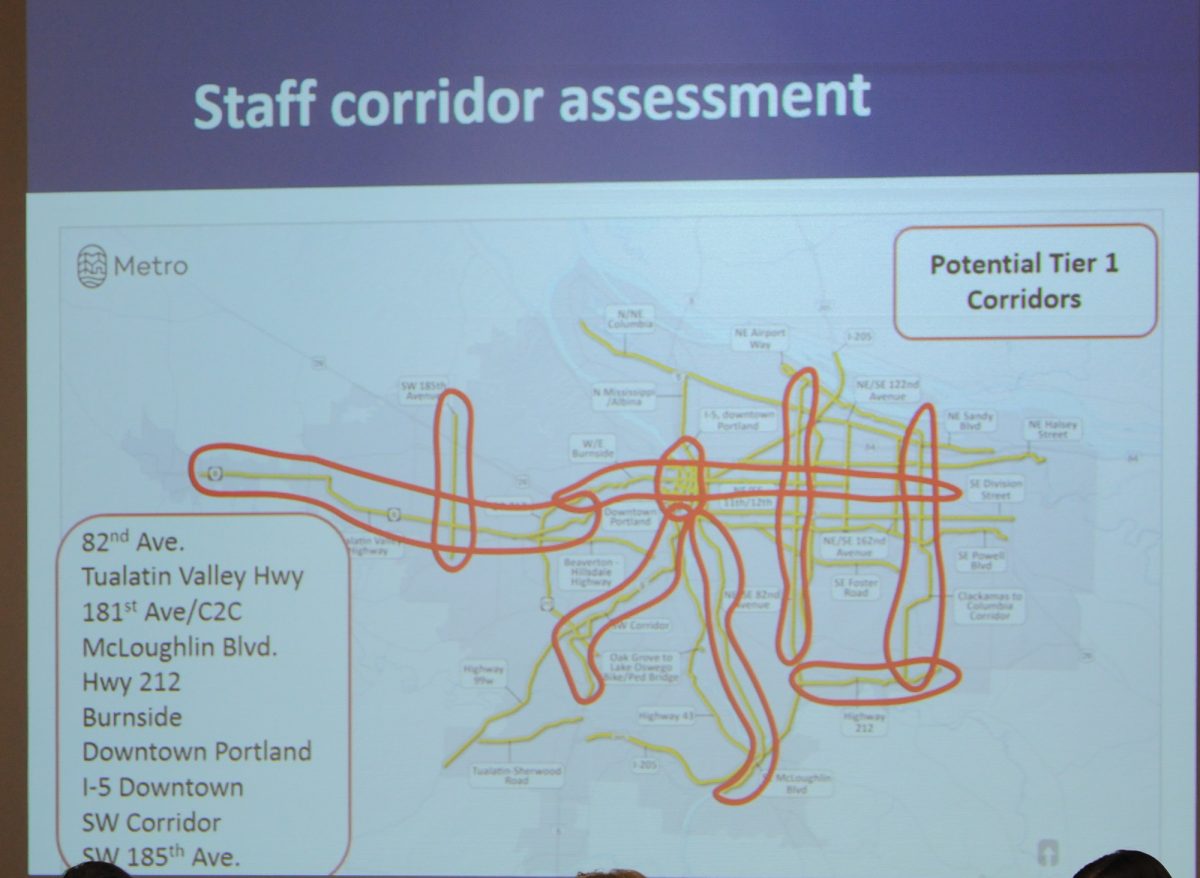
Then Metro’s Director of Government Affairs Andy Shaw unveiled the agency’s first attempt to place corridors in specific tiers. Their proposal for Tier 1 corridors includes: 82nd Ave, Tualatin Valley Hwy, 181st Ave, McLoughlin Blvd, Hwy 212, Burnside, Downtown Portland, I-5 Downtown, SW Corridor, and SW 185th. In a potential Tier 2 list, he included: Powell Blvd, 122nd Ave, MLK/Grand, Beaverton-Hillsdale Hwy, Foster Rd., Division St., Columbia Blvd, 162nd Ave, 99W/Pacific Hwy, Hwy 217, Tualatin-Sherwood Rd, Hwy 43/Macadam, and Sandy Blvd.
Then it was time for Task Force members to speak up. A facilitator said she wanted to get a “gut reaction” and asked members to hold up green, yellow, or red cards to express how they were feeling about the corridor discussion so far.
Advertisement
Milwaukie Mayor Mark Gamba was one of several people to thrust up a red card. “Virtually every single piece of public testimony we’ve had has spoken clearly and emotionally that the number one thing we have to think about is, ‘What are the climate impacts of this investment we are going to make?’… This is the only opportunity we will have to put this level of investment into our transportation sytstem in time to stop climate change. Climate change absolutely, positively, has to be the number one issue — and yet — of the categories being scored, climate isn’t even one of the categories,” he said.
“This process we have used for the decades — of piddling around, doing all these things before we actually get down to doing the thing that needs doing — has got to end.”
— Mark Gamba, Mayor of Milwaukie
Gamba expressed concern that Metro’s scoring only considers safety, equity, transit potential and readiness. He wants an evaluation of how much carbon reduction would result from investment in each corridor under consideration.
“Readiness should be the very last thing we’re considering. When the U.S. was bombed in Pearl Harbor, how ready were we for war? And yet how quickly, and how decisively did we then win that war. This process we have used for the decades of piddling around, doing all these things before we actually get down to doing the thing that needs doing has got to end. We have 11 years. Climate must be the number one consideration on this list.”
The room then erupted in several seconds of applause.
Task Force member Vivian Satterfield, an environmental justice advocate with Verde NW, expressed worries that some of the top tier corridors wouldn’t deliver high-capacity transit service. “I cannot in good conscience go forward and put my name and my organization behind anything that continues to expand and add road capacity to our region,” she said.
Portland City Commissioner Chloe Eudaly echoed Gamba’s remarks. “I’m surprised that climate is not clearly one of the determining criteria,” she said. “I’m not interested in decreasing congestion by making it easier for more cars to move through our streets.” Then Eudaly tied climate change concerns directly to politics: “This initiative is a statement of our values. If we don’t make it clear to the public that our top priority is averting climate catastrophe, I don’t see it passing in Portland. And we need Portland to carry this measure.”
Some of the tension in the room was the result of a common, chicken-and-egg problem that happens with processes like this: Agencies need general feedback on where to invest, but stakeholders need detailed information in order to give it. And given that the legacy of transportation funding has gone primarily to highway expansions, there’s an understandable lack of trust among progressive politicians and activists.
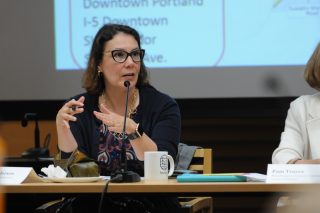
Task Force Co-Chair Jessica Vega Pederson tried to walk a line down the middle. She said staff told Task Force members that some metrics — like climate change — wouldn’t be possible to measure until after projects got more developed. Then Vega Pederson explained why she feels I-5 through Portland should be a priority. “I don’t have any desire to help ODOT fund a highway expansion project,” she said, “But I’m very interested in using investments in that area to connect neighborhoods in Portland that haven’t been connected before.”
Task Force member and Clackamas County Chair Jim Bernard said he too agrees with Gamba’s climate sentiments, but feels Hwy 212 (aka Sunrise Corridor) needs to be expanded. “It’s one of the fastest growing communities in the state of Oregon, and transit is poor,” he said. “The Sunrise Corridor opens up a lot of land for opportunity… For me, it’s about the jobs-housing balance.”
The lines are being drawn and it will be a very interesting debate from here on out.
“Ultimately we need to put together a package that resonates with our values and with voters,” Vega Pederson said in closing remarks. “I’m confident we can get there.”
As Task Force members filed out of Metro HQ, they were serenaded with songs about hope and love from Sunrise PDX:
*The Getting Together Coalition has released their tiered corridor recommendations. Read the PDF here.
— Jonathan Maus: (503) 706-8804, @jonathan_maus on Twitter and jonathan@bikeportland.org
Never miss a story. Sign-up for the daily BP Headlines email.
BikePortland needs your support.



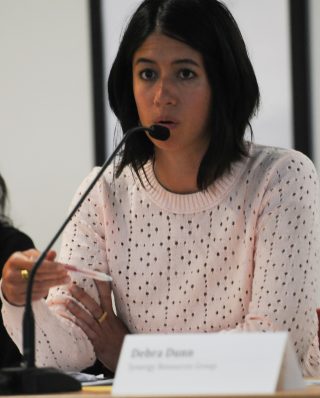

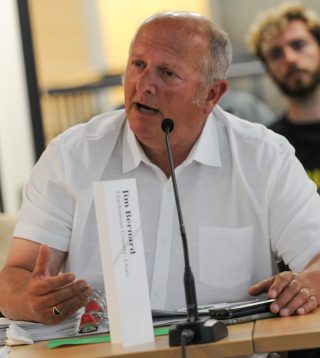
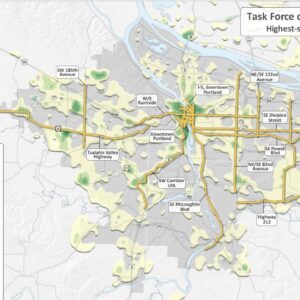


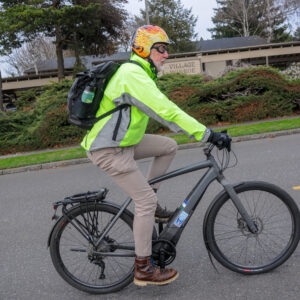
Thanks for reading.
BikePortland has served this community with independent community journalism since 2005. We rely on subscriptions from readers like you to survive. Your financial support is vital in keeping this valuable resource alive and well.
Please subscribe today to strengthen and expand our work.
Excellent article, Jonathan. Thanks for the coverage.
Highway 212 has a higher scoring than Beaverton-Hillsdale / Farmington ?
And as a side note:
METRO – please do not forget to council with your “non voting” members, like Vancouver.
I fear that if the CoV Council ‘blinks’ and fails to build the full separated bikeway / complete streets (as initially proposed) along two of their most important westside multimodal routes then Vancouver’s commuters into Portland jobs will just “soak up” any carbon savings from METROs efforts. [Sadly much of their public discussion to date has been about protecting the sanctity of on-street residential vehicle storage vs. traffic safety, complete streets / VZ and mobility over parking…and not even getting into the climate discussion.]
The last thing I heard from Vega Pederson was a statement about how electric cars would solve our problems (unfortunately, I can’t remember precisely what question was presented to her).
EVs will likely be a “two edged sword”: less carbon emissions per mile, but then by lowering the per mile cost they may induce more driving (more suburbanization / longer commutes…often with “less guilt”, etc.).
Elected officials and nonprofits have traditionally proposed electrification of transportation as the path forward. However, even under the most optimistic scenarios (see below), battery electric vehicles are projected to make up only 4-5% of vehicles being driven in 2030. The unwillingness of politicians to propose realistic paths forward to addressing transportation emissions is a form of climate change denial.
http://www.oecd.org/about/publishing/GlobalEVOutlook2018_corrigendum_pages.pdf?fbclid=IwAR20JS2PWTWGk4nOCHXjwRSqJg_IZJlGj7gqd2u4E9WKDxCG-yiORdvMA0Y
We also have made little progress in installing the infrastructure needed for widespread electrification. The fact that EVs are predominantly used by wealthy people who can afford to install a charger in their home underlines this point:
https://www.eia.gov/todayinenergy/detail.php?id=36312
Correct link to IEA EV 2018 report:
https://www.iea.org/gevo2018/
It’s amazing at this late date that we still think we can have it all if we just make a few tweaks (electric cars instead of gas cars, autonomous vehicles to address parking woes, etc.). In reality, we need to consume a lot less and consolidate our consumption (transit instead of cars, more road space for active transportation, etc.).
As Oregon becomes a hail mary destination for more and more climate refugees (and it will, with every major publication touting the Pacific Northwest as one of the safest places to be), we really need good systems in place so people can get rid of their cars. Pressure to build highway capacity is not going to let up until it is truly convenient to get around the entire Metro region using transit (that means affordable tickets, waits of no longer than 15 minutes, 24-hour/7-day service, good, omnipresent security and rigorous attention to cleanliness and good repair). And because keeping motorists happy is still considered a more real and pressing concern than climate change, we WILL run out of time. Add another 400,000 cars to the roads, as we did over the past few years, and no elected official will be free to do anything but add capacity for cars.
Nice piece, JM.
>>> Gamba expressed concern that Metro’s scoring only considers safety, equity, transit potential and readiness. He wants an evaluation of how much carbon reduction would result from investment in each corridor under consideration. <<<
I think this metric should automatically be built into all public projects moving forward. Call it a Climate Impact Statement.
Every highlighted, colored line on that map is a road that I avoid like the plague! Like to the extent that I don’t consider them to be my roads. My roads are this other, parallel and intersecting network, where I’m less likely to be killed & maimed. Invest in MY roads, goddammit! Or actually, never mind, just stop investing in roads.
It’s tempting to be optimistic that deciding to focus on these particular roads (basically “car roads”) will improve things. But why do I have the more-than-sneaking suspicion that nobody has the revolutionary mindset necessary? For what percentage of people in the room does “corridor” mean “car place” and “investment” mean “more lanes?”
We collectively need to invest less, if anything. And do less. And travel less, and shop less. Like “eliminate every one of these corridors” would be on the level of the kind of revolutionary mindset needed here. I don’t even like the word “corridor” because it gives an air of inevitability. “Pestilence” or “pestilence corridor” might be better, but I jest. But yeah, depave them all, that would be a fun idea. Since we’re allocating all this money.
The disconnect between that idea and the likely outcome, tells you the magnitude of what we’re up against here.
Most of those highlighted corridors have public transit, though. Future bus-only lanes one day ?
Yeah that’s in my (mentioned but not expounded) optimistic scenario. If those roads were full of buses and the occasional commercial truck, I would count that as a huge success.
The Staff Corridor Assessment graphic looks like rapidly expanding slime mold.
Too little, too late.
We are well past the point of being able to steer the climate back. This rollercoaster has crested the top and is only going to gain more speed.
Oh-ho!
You’re starting to sound like me!?
Soren,
it’s not just the USA – pretty much the rest of the world’s population has contributed as well. I understand it’s cool to blame Americans for everything as if we are the only contributors to the world’s issues but you’ve left China, Russia, etc out of the discussion.
You seem to be perceiving it as a selfish issue but I consider it being pragmatic. Portland is roughly the 600th largest metropolitan area in the world. Population of the planet is growing. What we do will have pretty much zero impact upon reversing climate change. It’s happening and it’s going to happen even more. Genie is out of the bottle. It’s best to plan for adapting to the effects of it.
Working solution? Let’s call Thanos.
“It’s best to plan for adapting to the effects of it.”
“Too little, too late.”
I love the toasty smell of ‘murrican cognitive dissonance in the am.
Cognitive dissonance is thinking the Scooby Gang is going to solve the problem. We missed that chance decades ago. This is like the person, who when hitting 55 years old and finds they have Congestive Heart Failure, starts eating well and exercising.
Sure, we might slow the growth of emissions (not a bad thing) but there will still be growth. Add that to a growing population…it’s not looking great for Homo sapiens sapiens.
So, in essence, you are arguing that we should believe a random blog commentator instead of the IPCC or peer-reviewed science.
It’s so incredibly shocking that once it became increasingly difficult to deny the reality of climate change, many libertarians and conservatives immediately switched to denying that we can do anything to mitigate it.
And, BTW, adaptation as a mitigation strategy is addressed in detail in the IPCC 5th Assessment Report. Believe it or not…it’s not an idea that libertarians or conservatives invented all on their own:
https://www.ipcc.ch/report/ar5/wg3/
The epitome of USAnian ethics: my actions have already harmed/killed people so I’m just going to continue harming/killing people. Nothing can be done.
This is a sentiment that needs more consideration and attention. While the mass extinction going on this very moment across the planet and the carbon emission levels are breaking records, it is important to not paint the situation as without any hope no more how dire the outcomes may be even under best cases. People will say, “We’re fucked and there’s nothing we can do to change it.” That compounds the problem and harms working solutions from being adopted. We need climate impact assessments in the analysis of every project as a minimum.
Exactly. If we’re fubar regardless, why should I support disruptive change? We need to believe that change is urgent and will make a difference.
And that sums up human nature quite well. Wait until there is a disaster and then make changes. The whole world is not going to change behaviors over what is perceived to be gradual changes (to them).
Is there a prize for second highest?
Whilst still emitting the highest levels per-capita in the world. The “but China” crowd is either ignorant, or are intentionally scapegoating so they can feel better about themselves.
Thank you Sunrise!
if you want to show your support to the youth of portland rabblerousing for their future, consider throwing a couple bucks to the local sunrise chapter:
https://mailchi.mp/658395cbff82/breaking-sunrise-pdx-youth-take-over-metro-transportation-meeting-171693?e=2728a0059d
If you cared about the environment, then you would of stopped at 2 kids. Get over yourself Maus.